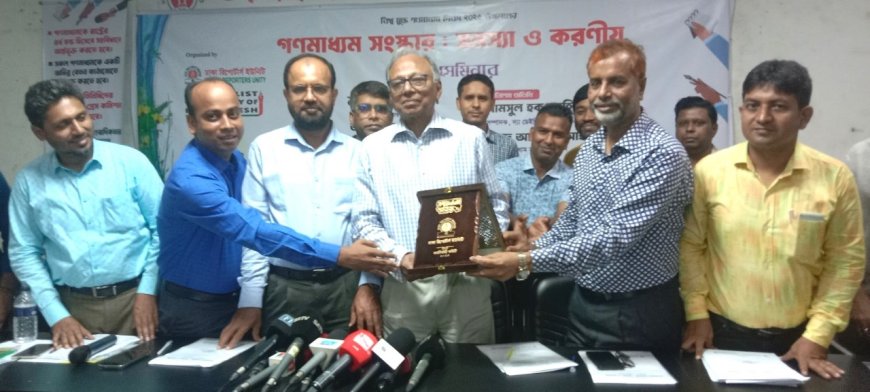Media Modernization Moots Major Reforms

On Thursday, May 8, 2025, speakers at a seminar in Dhaka demanded constitutional recognition of the media as the fourth pillar of the state, inclusion of the right to information as a fundamental right, and the introduction of a standardized salary structure for professionals in print, electronic, and online media.
These demands were raised at a seminar titled "Media Reform: Problems and Solutions" organized by Dhaka Reporters Unity (DRU) and the Journalist Community of Bangladesh, held at the DRU auditorium to mark World Press Freedom Day. Editor of Amar Desh Mahmudur Rahman attended the event as the chief guest.
Presided over by DRU Vice President Gazi Anwar and moderated by General Secretary Mainul Hasan Sohel, the seminar was attended by prominent media figures including Shamsul Huq Zahid, a member of the Media Reform Commission and Editor of The Financial Express, M Abdullah, Managing Director of the Journalists Welfare Trust, and Shahidul Islam, President of the Dhaka Union of Journalists. Other speakers included Joint Secretary Didarul Alam and senior journalist Asif Shaukat Kallol.
A keynote paper was presented by Md. Mia Hossain, Member Secretary of the Journalist Community of Bangladesh. The event was supported by TapTap Send, a mobile application for remittance transfers.
DRU Organizing Secretary Abdul Hai Tuhin, Office Secretary Rafique Rafi, IT and Training Secretary Md. Borhan Uddin, Cultural Secretary Emdadul Haque Khan, Hospitality Secretary Mohammad Selim Ullah (Mezbah), Welfare Secretary Rafique Mridha, and Executive Members Md. Junaid Hossain (Junaid Shishir), Akhtaruzzaman, Aminul Haque Bhuiyan, Suman Chowdhury, and Md. Selim Ullah (S.U. Selim) were also present. Crest awards were presented to the chief and special guests by DRU.
Speakers further demanded that all media be included in the national media list, national awards be introduced for journalists akin to the film industry, clear legal provisions be made for declarations related to satellite TV, radio, and online media, and a law be enacted to form an Independent Media Commission comprising elected representatives. They also called for the repeal of repressive laws and the withdrawal of all cases filed under the Cyber Tribunal.
Expressing dissatisfaction, participants criticized the Media Reform Commission for excluding key stakeholders. “We are not satisfied with the report they have presented. We demand absolute freedom of the press. There was no media freedom in the past 16 years. We do not want a repeat under the current government,” said a speaker.
In his keynote address, Amar Desh editor Mahmudur Rahman said, “In the past 15 years, fascist Sheikh Hasina has destroyed all public and private institutions. The police, judiciary, and press have faced the worst image crisis. The judiciary became a machine of injustice and senior editors compromised their integrity, pushing the entire journalism community into a credibility crisis.”
He added, “The person who tainted the judiciary the most—Mohammad Nizamul Haque Nasim—was made chairman of the Press Council. What can we expect from such an appointment? That move rendered the institution ineffective. Journalists should have protested, but no one did. Our NOAB and Editors’ Council represent the elite class. Some say NOAB is like a ‘nawab.’ Amar Desh is not part of that elite; we want to stand for the common people.”
Referring to the lack of holidays for media professionals, Rahman said, “Government employees will receive 10 days off for Eid-ul-Azha. If I had the power, I would declare at least a four-day holiday today. But I don’t. The so-called elite groups like NOAB and Editors’ Council will make that decision. Still, a minimum four-day break during Eid is necessary. Those working online during holidays must be compensated fairly.”
He further emphasized, “The media has yet to become the fourth pillar. Before claiming that status, we must learn to stand tall. We must unite for press freedom. If the upcoming government does not accept these reforms, we must be prepared with a plan.”
Shamsul Huq Zahid, Editor of The Financial Express, remarked, “Before independence, there was no press freedom, and the same situation continued afterward. In 1975, newspapers were shut down and journalists became jobless. After the 1990 elections, some freedom returned, but it was again curtailed after 2006 and continued for 16 years. There was no proper working environment. That’s why we have focused on key issues in media reform—journalistic freedom and financial security. The aim is to ensure conditions where, except during wartime, these rights cannot be taken away.”
M Abdullah, Managing Director of the Journalists Welfare Trust, stated, “Many say the past was better, but nothing changes magically overnight. For the past 16 years, we could not celebrate World Press Freedom Day freely. There were restrictions everywhere. No one could write freely. Now that environment has changed, and journalists are writing freely. But we must be cautious about how long this will last.”
Shahidul Islam, President of the Dhaka Union of Journalists, recalled, “There was a time when asking for information meant risking assault. In some cases, journalists were detained for hours and handed over to police. Now we are working in a freer environment. We want absolute freedom. We must remain vigilant to prevent future threats and lawsuits.” He called upon all journalists to work together for independent journalism.
Mainul Hasan Sohel, General Secretary of DRU, said, “In the past 54 years, journalistic freedom has never been secured. Even under the new administration, no improvements have occurred for journalists. There is no job or wage board security. We must work collectively to ensure our rights. I urge the inclusion of media as the fourth pillar in the Constitution and the formulation of a unified salary structure for all journalists.”
In his concluding remarks, DRU Vice President Gazi Anwar said, “The reform committee was bureaucrat-centric, which was a mistake. Though we submitted recommendations, they were not implemented. We now call for a new reform committee involving journalists.”









































































































































































































